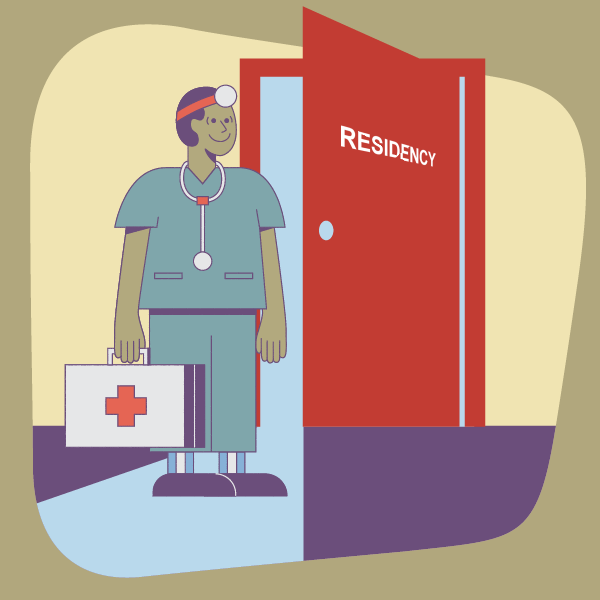Locum tenens gives physicians many things: work/life balance, fewer administrative hassles, extra income, professional independence, and the freedom and flexibility to do humanitarian work.
For family medicine physician Dr. Stanley Green, locum tenens ticks all those boxes. He says he was lucky to discover what locum tenens could do for him right out of residency, and he’s worked locums exclusively since his graduation in 2016.
“This is a model I’m seeing more and more,” Dr. Green says. “More folks who are straight out of residency are starting out as locums.”
Though Dr. Green is a locum tenens physician, at the moment he works exclusively at a hospital in Pittsburgh. After his first assignment there, he was asked to extend his assignment. Dr. Green has also taken assignments in a couple of hospitals in the Dayton, Ohio, area. One assignment was at a rural hospital and another in downtown Dayton.
“I had rotated though West Penn Hospital [his current assignment] while I was in medical school, so I was familiar with it,” he says. “I really enjoyed that hospital, so when I heard of the opportunity I took it.”
The freedom to focus on patient care
He’s found that the money he’d earn in a permanent position doesn’t compare to what he earns working locums. He said he earns 25-35% more working locums than what he’d earn in a hospital system. The other benefits?
“While my other colleagues are burdened with scheduling issues, staff meetings, and other administrative hassles, I’m able to give all my attention to the patient,” Dr. Green says.
The freedom to focus on patient care rather than attend extra meetings, deal with hospital bureaucracy, and have extra trainings is something that his colleagues are envious of. He’s found that he’s been a better advocate for his patients than he could be if he were on the payroll, and he can do so without simultaneously worrying about interoffice politics.
“I think that makes me a better patient advocate because I know the only thing that really matters to me is the quality of patient care.”
Making each patient feel “special”
Rather than being put off by the fact that Dr. Green isn’t a local, his patients aren’t the least bothered. He’s even been told by some that it makes them feel special that he came all the way from Florida to take care of them.
“It’s led to a bunch of interesting conversations,” he shares. “People feel like I take the time to listen, to talk to them. They appreciate that even though I’m not a permanent member of the staff at the hospital, I can still provide the kind of care they would expect from their local hometown doc.”
His patients are also a great source of suggestions for things to see and do when they hear he’s not a native.
Dr. Green adds that with his seven days on, seven days off schedule as a locums, he’s able to focus solely on patient care while he’s on assignment. But when he’s home in Florida, his wife gets his full attention since he’s not worrying about what’s happening at the hospital.
“Since my schedule is pretty stable, I’m free to just hang out with my wife the entire week,” he says. “We end up doing a lot of traveling and hosting our friends who live in colder climates.”

Humanitarian aspirations
A South African by birth, Dr. Green is determined to return to his home country someday and give back to the place he came from. While there’s a need for doctors in the U.S., he says there’s a more acute need in the KwaZulu-Natal Province that’s been particularly hard-hit by the AIDS epidemic. There’s a hitch though.
“The kind of money I’d make in South Africa would never enable me to pay off my student loans,” he says. “I’d basically be paying interest for the rest of my life. But with the flexibility and money I earn working locums, I envision that I’ll stay with locums for some part of the year and live in both places, maybe working three to four months in the States. Then with the money I earn here I can facilitate living the rest of the year in South Africa and getting paid little or nothing.”
Even his financial advisor recommended sticking with locums if he wants to pay off his student loans more quickly while doing the humanitarian work he’s planning to do in South Africa.
Answering other doctors’ questions about locum tenens
Being peppered by questions about locum tenens from colleagues just out of residency is commonplace, he says.
“I frequently get asked about things pertaining to the logistics of working locum tenens,” Dr. Green shares. “Things like ‘Do I have to pay for housing and car rental?’ – which is nothing – and of course what the pay and schedules are like.”
Dr. Green also gets a lot of questions about the assignment locations, since a lot of physicians seem to assume that locum tenens get sent to the least desirable locations.
“They think you get sent to a trash pit somewhere in some dumpster-fire hospital, and you end up having to manage things under armpit conditions. I always say I’ve never had a situation that I felt overworked or where I thought I was in danger.”
And what if physicians find themselves in these situations?
“I tell them, ‘You don’t have to go back,’” he says. “My agency vets their hospital pretty thoroughly.”
Locum tenens at the right time
Dr. Green couldn’t be happier that he was introduced to locum tenens right out of residency. It’s given him the ability to create a schedule perfectly suited to his lifestyle, and it’ll eventually allow him to realize his ultimate goal of giving back in his native South Africa.
“I really love my job, and I feel like every day there’s something that happens which reminds me of that.”
Learn what residents think of locum tenens
Emergency medicine residents share their perception of locum tenens:



